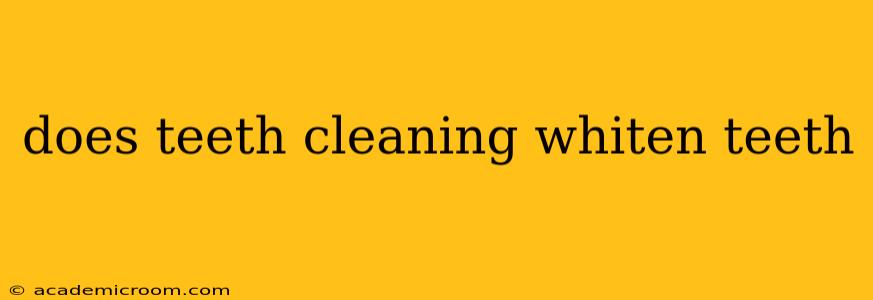Regular teeth cleaning is a crucial part of maintaining good oral hygiene, but does it actually whiten your teeth? The short answer is: yes, to a certain extent. While a professional cleaning won't give you the dramatic results of teeth whitening treatments, it can significantly improve the brightness of your smile. Let's delve deeper into how and why.
How Does Teeth Cleaning Whiten Teeth?
Professional teeth cleaning, also known as prophylaxis, removes the buildup of plaque, tartar (calculus), and surface stains from your teeth. These deposits can dull the appearance of your enamel, making teeth look yellow or discolored. A hygienist uses specialized tools and techniques to thoroughly clean your teeth, both above and below the gum line. This removal of surface stains reveals the brighter, underlying enamel.
Think of it like this: imagine a beautiful, polished piece of marble. Over time, dirt and grime accumulate on its surface, obscuring its natural brilliance. Cleaning the marble removes the dirt, restoring its original luster. Similarly, cleaning your teeth removes the stains and discoloration, revealing a brighter smile.
What Kind of Stains are Removed During Cleaning?
Professional cleaning effectively removes extrinsic stains. These are stains that occur on the surface of your teeth. Common causes of extrinsic stains include:
- Coffee, tea, and red wine: These beverages are notorious for staining teeth.
- Tobacco: Smoking and chewing tobacco significantly contribute to teeth discoloration.
- Certain foods: Foods with strong pigments, such as berries and curry, can also stain teeth.
What Kind of Stains are NOT Removed During Cleaning?
It's important to note that teeth cleaning does not remove intrinsic stains. These stains are located within the tooth enamel or dentin. Causes of intrinsic stains include:
- Medications: Certain antibiotics taken during tooth development can cause discoloration.
- Fluorosis: Excessive fluoride intake during tooth development can lead to staining.
- Trauma: Injury to a tooth can sometimes result in internal discoloration.
- Aging: Natural aging processes can lead to slight yellowing of the teeth.
Will Teeth Cleaning Make My Teeth Perfectly White?
While teeth cleaning will brighten your smile by removing surface stains, it won't make your teeth perfectly white like professional whitening treatments might. For significantly whiter teeth, you may consider professional whitening procedures offered by your dentist. These treatments use bleaching agents to lighten the underlying tooth enamel.
How Often Should I Get My Teeth Professionally Cleaned?
The American Dental Association (ADA) recommends professional teeth cleanings every six months. However, your dentist may recommend more frequent cleanings depending on your individual needs and oral health. Regular cleanings are essential not only for whitening but also for preventing gum disease and other oral health problems.
Can I Whiten My Teeth at Home?
Yes, several at-home whitening options exist, including whitening toothpastes, strips, and mouthwashes. However, it's crucial to discuss these options with your dentist to ensure they are safe and effective for your teeth. Overuse of some home whitening products can damage your enamel.
What's the Difference Between Teeth Whitening and Teeth Cleaning?
Teeth cleaning focuses on removing surface stains and plaque buildup to improve oral hygiene and brighten teeth slightly. Teeth whitening, on the other hand, employs bleaching agents to chemically lighten the tooth enamel, resulting in a more dramatic whitening effect.
How Much Does Professional Teeth Cleaning Cost?
The cost of professional teeth cleaning varies depending on your location and dental insurance coverage. It's best to contact your dental office for specific pricing information.
In conclusion, while professional teeth cleaning is not a teeth whitening treatment in the strictest sense, it plays a significant role in improving the brightness of your smile by removing surface stains. Combining regular cleanings with good home oral hygiene practices can maintain a healthy and brighter smile. Remember to consult with your dentist for personalized advice on maintaining optimal oral health.
